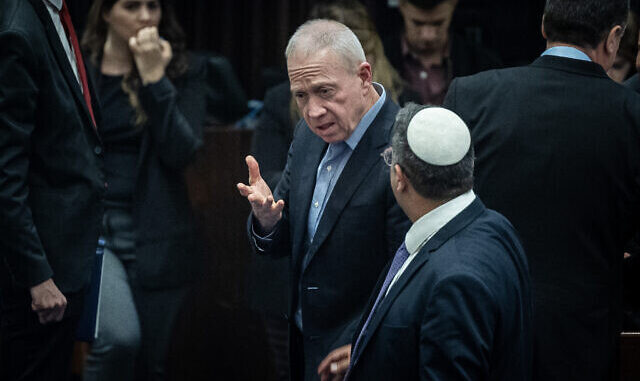T. Belman. Administrative detention is a drastic tool to legalize as it overturns too principles of criminal law, namely habeas corpus and “innocent until proven guilty”. Even so, in a democracy, martial law if declared suspends these two principles. In general, the suspension of these rights should not be entertained without great justification.
“According to the proposal, Ben Gvir would be able to approve renewable administrative detentions for up to six months for anyone the minister thinks poses a danger to the public, if the move is requested by the police commissioner and with the approval of the attorney general, the state attorney or one of their deputies.”
How likely will these pre-conditions be met”
Defense minister tells Justice Minister Levin legislation giving national security minister power to use administrative detention could bring ‘harm to national security’
By TOI STAFF

Defense Minister Yoav Gallant, center, speaks to National Security Minister Itamar Ben Gvir after a Knesset vote in Jerusalem, February 15, 2023. (Yonatan Sindel/Flash90)
Defense Minister Yoav Gallant has reportedly sounded the alarm against a bill that would grant far-right National Security Minister Itamar Ben Gvir the ability to order criminal suspects detained indefinitely without trial, among other expanded powers, slamming the legislation as a potential security threat.
In a report on Saturday by Channel 12, Gallant was quoted as telling Justice Minister Yariv Levin that “without a rich security context for the use of the tool, the proposal could lead to the undermining of public and judicial legitimacy to the very existence of these tools, and to the expansion of international criticism on the matter.”
“Undermining the legitimacy for these tools may directly cause harm to national security,” he reportedly added.
The bill, which Ben Gvir has said is aimed at countering a wave of violent crime in Arab communities, has been slammed by the State Attorney’s Office as a “threat to democracy” and is said to be opposed by the Shin Bet.
Administrative detention is a controversial practice whereby suspects are temporarily jailed without charge, trial, or guaranteed access to evidence against them, for renewable increments of up to six months. It is a tool reserved for the defense minister to hold terror suspects.
The proposed bill being advanced by Ben Gvir’s far-right Otzma Yehudit party would allow the temporary jailing of criminal suspects without charge or trial in order to clamp down on the violent crime wave. It is set to be discussed at the Knesset’s Ministerial Committee for Legislation on Sunday, with the high-level government panel having delayed issuing its stance on it for three consecutive weeks.
According to the proposal, Ben Gvir would be able to approve renewable administrative detentions for up to six months for anyone the minister thinks poses a danger to the public, if the move is requested by the police commissioner and with the approval of the attorney general, the state attorney or one of their deputies.
Aside from the expanded powers to jail citizens, the bill grants the minister power to act alone, under certain circumstances, in ordering restrictions on where a person can live or visit, limit who they can speak to, forbid them from using the internet, and place curbs on what they can purchase or what services they are allowed to receive or actions they are allowed to perform
In the legal opinion by the State Attorney’s Office sent to Justice Minister Yariv Levin last month, it said: “This bill — similar to other initiatives being considered these days — constitutes a dramatic change to world order in criminal enforcement in Israel, and also presents a deep and fundamental threat to the democratic character of the country.”
The “other initiatives” appeared to refer to the coalition’s controversial plans to shackle the country’s judiciary.
“The administrative arrest of a person presumed to be innocent — without sufficient evidence, without reasonable suspicion that a criminal offense was committed and while relying only on intelligence information about future and abstract suspicions, and without a time limit — constitutes a fatal violation of the right to freedom and dignity,” it said.
The letter calls on Levin to immediately reject the bill.
Administrative detention is primarily used with Palestinians — about 1,000 of whom are currently held in custody under the practice. The practice has also been used with a handful of Jewish Israeli terror suspects in recent years, though Ben Gvir and other far-right leaders have come out against its employment in such cases.

Police Commissioner Kobi Shabtai (left) and National Security Minister Itamar Ben Gvir at the Israel Police Independence Day ceremony at the National Headquarters of the Israel Police in Jerusalem, April 20, 2023. (Oren Ben Hakoon/Flash90)
The legal feasibility of employing administrative detention to fight crime is unclear. Ben Gvir has already clashed with Attorney General Gali Baharav-Miara for blocking several of his initiatives.
Since his appointment as national security minister, Ben Gvir has sought to exercise more direct control over police operations and personnel, including a botched attempt to remove the Tel Aviv police commander, and has pushed to expand his powers, in moves critics say tamper with the independence of the police.
Ben Gvir, who ran on a tough-on-crime platform, has faced intense criticism over rising terror attacks and a sharp jump in murders in Israel’s Arab communities since late December that has left 123 people dead in 2023 so far, more than double the 56 slayings recorded to this point last year.
Many Arab community leaders blame the police, who they say have failed to crack down on powerful criminal organizations and largely ignore the violence, which includes family feuds, mafia turf wars, and violence against women. The communities have also suffered from years of neglect by state authorities.
Ben Gvir and Prime Minister Benjamin Netanyahu have been pushing for the Shin Bet security service to get involved in fighting crime. The security agency has taken a stance against the proposal; its leader Ronen Bar has reportedly sought to convince politicians that doing so would distract from the Shin Bet’s main task of fighting terror.
Senior officials in the Shin Bet have also reportedly expressed worries that they may not have the legal authority to employ tools used in the fight against Palestinian terror on civilians instead.
In June, Police Commissioner Kobi Shabtai told a Knesset committee that the force was unprepared for a “multi-front” outbreak of violence across the country such as the rioting and ethnic clashes that accompanied a 2021 Gaza war, pointing to a lack of “manpower, resources, means and equipment” that he said was preventing police from “rising to the occasion.”



The political capital which will be needed to pass this bill should be considered in light of the extreme requirement under which it might be exercised. The need for the the police commissioner and the AG or one of the state attorneys to request that this law be triggered renders it a toothless tiger and remotely likely to ever be employed, even if it were needed.